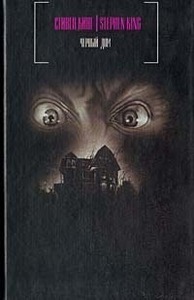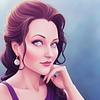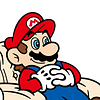Take a photo of a barcode or cover
When I first read this years ago, I liked part 1 better than part 2, but now it's the reverse. I absolutely love how different story lines are interwoven.
I loved 'The Talisman' so much. It was fun and fantastical, creative and unexpected. But I have no idea what this one is. I couldn't wait for it to end. Other than for fully putting 'The Talisman' into the Dark Tower realm (which I think we could have done without this book), 'Black House' could have just been its own book. There is too much here and none of it was all that interesting.
adventurous
dark
mysterious
medium-paced
8.5 swarming bees out of 10
This is a great sequel to The Talisman. Jack Sawyer is now an adult who has retired from the L.A. PD and moved to a small town in Michigan. He does not remember his journey into the territories and the things he did when he was 12. It is not until he drug into a case involving a local serial killer called The Fisherman that he starts to remember his past which will help him catch the killer and save a local boy taken by the killer.
This book is a slow burn, it starts out really slow. The first 100 or so pages you are thinking what the hell is going on, what does any of this have to do with anything. Trust me stick with it because when everything comes together this book will take you on an amazing journey that has deep ties to The Dark Tower series! This is a great read, Stephen King at his best. What I really enjoyed is when you read books by two authors I usually can pick up who wrote what especially if one of them is an author I read a lot. In this case Stephen King, I could not tell who wrote what. I have not read any Peter Straub other than The Talisman which is also written with Stephen King. After reading both books I will be adding Peter Straub to my TBR list.
This book is a slow burn, it starts out really slow. The first 100 or so pages you are thinking what the hell is going on, what does any of this have to do with anything. Trust me stick with it because when everything comes together this book will take you on an amazing journey that has deep ties to The Dark Tower series! This is a great read, Stephen King at his best. What I really enjoyed is when you read books by two authors I usually can pick up who wrote what especially if one of them is an author I read a lot. In this case Stephen King, I could not tell who wrote what. I have not read any Peter Straub other than The Talisman which is also written with Stephen King. After reading both books I will be adding Peter Straub to my TBR list.
Writing this before even getting to the end, because no matter how it ends my mind will not be changed. I almost never abandon books, and I have seriously considered abandoning this one 3 different times. I haven't read Talisman yet so I don't have any childhood attachments to these characters, even if I did though I don't know how I could like this. It is long, wordy, thin on plot, and mostly just boring. Had I known beforehand that this story was connected to the twin towers series I wouldn't have bothered starting it, as I felt similar about that series as well. I have been on a big Stephen King binge and enjoy most of this stories, mostly because how different they are from everything else, but this one was not worth the time it took to read.
This is the 2nd time I've tried to read this book but the beginning just draaaags along soooo sloooowwly!! I have never been able to force myself to read something that's not grabbing & keeping my attention so for this reason, I'm giving up. I truly do not understand why we need multiple paragraphs describing every tiny detail of the surrounding scenery, or the physical description of every building in town including its size and its relation to every other building in town. It's so unnecessary, and it made this book get very boring, very quickly.
The first 100 pages are a thing of beauty. Being hyper critical, it gets a bit boggy in places but overall its top quality stuff.
I want book 3 and I want it NOW.
I want book 3 and I want it NOW.
adventurous
challenging
dark
emotional
mysterious
reflective
sad
tense
medium-paced
Plot or Character Driven:
Character
Strong character development:
Yes
Loveable characters:
Complicated
Diverse cast of characters:
Yes
Flaws of characters a main focus:
Yes
[b:The Talisman|59219|The Talisman (The Talisman, #1)|Stephen King|https://images.gr-assets.com/books/1170530286s/59219.jpg|3324421] was the sort of book that a lot of people seem to idolise, even if so much of it was a product of a darker, far less progressive time. Where that book had a lot of good material, much of it was mired in the unnecessary. Some seventeen years later, Peter Straub and Stephen King teamed up again to bring back Jack Sawyer, in adult form. Like its predecessor, Black House features children in peril, but none of them are the protagonist. This remove makes the novel easier to take because no unsuspecting preteen boys are being preyed upon by literally every car driving man in America, and the two have a stronger grasp of both audience expectation and precisely what they’re plotting.
The Wisconsin town of French Landing is facing a spate of child abductions and, ultimately, consumptions, at the hands of the mysterious “Fisherman”. Jack “Hollywood” Sawyer, retired from the LAPD at only 31, is drawn into the case through a combination of a guilt trip from his next door neighbour and the call of the Territories, the alternate version of the United States that he traveled in his youth and can no longer remember. It becomes increasingly clear to the reader, if not to Sawyer himself, that the case can not be solved by a terrestrially based policeman alone.
Fans of King will feel right at home with Black House: a relatively small town is terrorised by a malevolent presence that exists on the borders of reason. Straub’s influence shows in the location of the action being the Midwest, rather than the surrounds of New England, but neither author gets in the other’s way. Just like the horn that Daddy played, this is fusion writing.
The narrators make their presence known and address the reader with more familiarity than you would expect from a standard novel (that is, none). This works most of the time, but is also key to Black House’s difficult entry passages, almost a fifth of the book. The reader is given a literal flying tour of the town of French Landing, which serves almost as much to disorient as it does to give us a flavour of the place that we inhabit for 800 odd pages. Every time that we are taken out of a character driven scene and swoop across town, some momentum is lost. Eventually Straub and King calm down, but the damage may be done early for less patient audiences.
Despite its length, Black House never feels long. King and Straub work hard to build up a firm ensemble of likeable characters, chief among them blind DJ Henry Leyden, who is several characters in one. Henry is endowed with genuine charisma and only one shortcoming that could not be helped due to narrative necessity. Similarly, key members of the Thunder Five bike gang become significantly more dimensional and sympathetic than they are initially made out to be. Jack Sawyer, in his thirties, is not a traditionally reluctant protagonist and is stronger for that, but it does take him a while to find his stride; that, of course, is his problem, and not that of his scribblers.
Partway through, Black House becomes very obviously a part of The Dark Tower cycle, and something of a sequel to Insomnia and Hearts in Atlantis. It’s hard to know what Straub made of King incorporating logical elements of his solo opus into their collaborative efforts, but these moments, which are spread liberally throughout but are very heavily concentrated around the 70% mark, make the overall work pop while still being accessible for less than Constant Readers. One doesn’t even need to have strictly read The Talisman , but of course it helps.
Black House builds towards something that is inevitable in its brevity, but one never needs feel shortchanged by this. If parts of its further conclusion are unsatisfying, King and Straub are somewhat apologetic in the body of the text. Earlier elements that become blind alleys step to the side for something that is admittedly developed across the text but feels almost like an afterthought. What it ultimately amounts to comes across as logical rather than neat or sentimental, and the final pages aren’t lacking for punch.
With fewer concessions to the Great American Fantasy novel than The Talisman and a marked increase in eldritch horrors and a large number of externalised internal organs, Black House becomes vivid - even lurid - but never exploitative. As Straub and King grow increasingly confident over the course of their shared quest, their novel grows ever more accomplished, building towards something equal to and more than the sum of its parts - rather like the titular house is bigger on the inside than out.
Black House is a sequel, but also an evolution. Jack Sawyer could not have stayed twelve forever, nor should he have. King and Straub are our guides on a masterful journey on the trail of rather more than a few partially digested limbs.
The Wisconsin town of French Landing is facing a spate of child abductions and, ultimately, consumptions, at the hands of the mysterious “Fisherman”. Jack “Hollywood” Sawyer, retired from the LAPD at only 31, is drawn into the case through a combination of a guilt trip from his next door neighbour and the call of the Territories, the alternate version of the United States that he traveled in his youth and can no longer remember. It becomes increasingly clear to the reader, if not to Sawyer himself, that the case can not be solved by a terrestrially based policeman alone.
Fans of King will feel right at home with Black House: a relatively small town is terrorised by a malevolent presence that exists on the borders of reason. Straub’s influence shows in the location of the action being the Midwest, rather than the surrounds of New England, but neither author gets in the other’s way. Just like the horn that Daddy played, this is fusion writing.
The narrators make their presence known and address the reader with more familiarity than you would expect from a standard novel (that is, none). This works most of the time, but is also key to Black House’s difficult entry passages, almost a fifth of the book. The reader is given a literal flying tour of the town of French Landing, which serves almost as much to disorient as it does to give us a flavour of the place that we inhabit for 800 odd pages. Every time that we are taken out of a character driven scene and swoop across town, some momentum is lost. Eventually Straub and King calm down, but the damage may be done early for less patient audiences.
Despite its length, Black House never feels long. King and Straub work hard to build up a firm ensemble of likeable characters, chief among them blind DJ Henry Leyden, who is several characters in one. Henry is endowed with genuine charisma and only one shortcoming that could not be helped due to narrative necessity. Similarly, key members of the Thunder Five bike gang become significantly more dimensional and sympathetic than they are initially made out to be. Jack Sawyer, in his thirties, is not a traditionally reluctant protagonist and is stronger for that, but it does take him a while to find his stride; that, of course, is his problem, and not that of his scribblers.
Partway through, Black House becomes very obviously a part of The Dark Tower cycle, and something of a sequel to Insomnia and Hearts in Atlantis. It’s hard to know what Straub made of King incorporating logical elements of his solo opus into their collaborative efforts, but these moments, which are spread liberally throughout but are very heavily concentrated around the 70% mark, make the overall work pop while still being accessible for less than Constant Readers. One doesn’t even need to have strictly read The Talisman , but of course it helps.
Black House builds towards something that is inevitable in its brevity, but one never needs feel shortchanged by this. If parts of its further conclusion are unsatisfying, King and Straub are somewhat apologetic in the body of the text. Earlier elements that become blind alleys step to the side for something that is admittedly developed across the text but feels almost like an afterthought. What it ultimately amounts to comes across as logical rather than neat or sentimental, and the final pages aren’t lacking for punch.
With fewer concessions to the Great American Fantasy novel than The Talisman and a marked increase in eldritch horrors and a large number of externalised internal organs, Black House becomes vivid - even lurid - but never exploitative. As Straub and King grow increasingly confident over the course of their shared quest, their novel grows ever more accomplished, building towards something equal to and more than the sum of its parts - rather like the titular house is bigger on the inside than out.
Black House is a sequel, but also an evolution. Jack Sawyer could not have stayed twelve forever, nor should he have. King and Straub are our guides on a masterful journey on the trail of rather more than a few partially digested limbs.
I thought this was a great read. The book surprised me in a number of ways.
1. My expectations were low because I disliked The Talisman, which I find boring and tedious--the narrative would just stop for dozens of pages. The whole style of Black House is different, with a much better flow of events and much more interesting characters. It is horror, not fantasy, which I think was a huge improvement.
2. I knew this was Dark Tower-adjacent, but I had no idea it was so much Dark Tower, especially in the second half. But it has changes, I guess as King was fleshing out his ideas. In particular, the breakers are shown as slaves in a hellhole, whereas in the series, they are in prison camps but actually treated well to get the most productivity out of them.
3. There is mention of Ted Brautigan, and of course Roland, palavers, sai, and other such stuff. Funny for a Straub book to have so much stuff that is really owned by King. Really, full appreciation of this book requires having read all Dark Tower novels. It's not really a sequel to The Talisman. It's Jack Sawyer doing Dark Tower stuff. That must've mystified (annoyed?) a lot of people who bought it.
4. But I find it strange that, as far as I know, neither Jack Sawyer nor Ty is mentioned in later Dark Tower novels.
5. It is really grisly. Oh man. But it works within the novel.
I have a few quibbles--the flying-around style of narration, with the narrator speaking to the reader directly, didn't work for me, though I got used to it. The notion of hardcore bikers who were also English and Philosophy college graduates was just weird (though I did like the characters). I also kept wondering how Henry knew so much about sports when there is zero indication that he actually follows sports. But those are minor.
1. My expectations were low because I disliked The Talisman, which I find boring and tedious--the narrative would just stop for dozens of pages. The whole style of Black House is different, with a much better flow of events and much more interesting characters. It is horror, not fantasy, which I think was a huge improvement.
2. I knew this was Dark Tower-adjacent, but I had no idea it was so much Dark Tower, especially in the second half. But it has changes, I guess as King was fleshing out his ideas. In particular, the breakers are shown as slaves in a hellhole, whereas in the series, they are in prison camps but actually treated well to get the most productivity out of them.
3. There is mention of Ted Brautigan, and of course Roland, palavers, sai, and other such stuff. Funny for a Straub book to have so much stuff that is really owned by King. Really, full appreciation of this book requires having read all Dark Tower novels. It's not really a sequel to The Talisman. It's Jack Sawyer doing Dark Tower stuff. That must've mystified (annoyed?) a lot of people who bought it.
4. But I find it strange that, as far as I know, neither Jack Sawyer nor Ty is mentioned in later Dark Tower novels.
5. It is really grisly. Oh man. But it works within the novel.
I have a few quibbles--the flying-around style of narration, with the narrator speaking to the reader directly, didn't work for me, though I got used to it. The notion of hardcore bikers who were also English and Philosophy college graduates was just weird (though I did like the characters). I also kept wondering how Henry knew so much about sports when there is zero indication that he actually follows sports. But those are minor.





